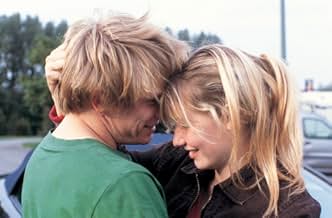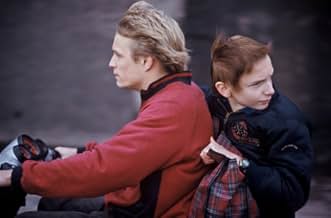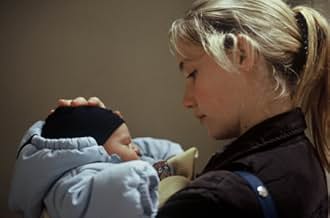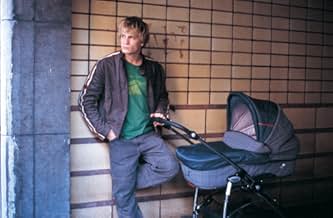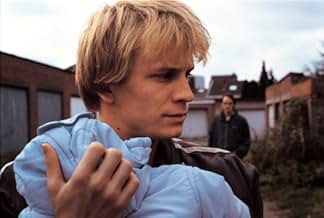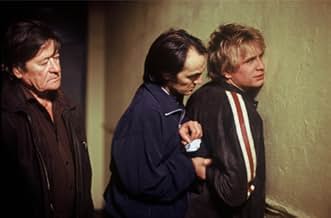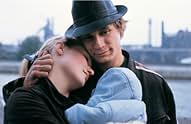AVALIAÇÃO DA IMDb
7,4/10
20 mil
SUA AVALIAÇÃO
Bruno e Sonia, um jovem casal que vive de seus lucros e dos roubos cometidos por sua quadrilha, têm uma nova fonte de dinheiro: seu filho recém-nascido.Bruno e Sonia, um jovem casal que vive de seus lucros e dos roubos cometidos por sua quadrilha, têm uma nova fonte de dinheiro: seu filho recém-nascido.Bruno e Sonia, um jovem casal que vive de seus lucros e dos roubos cometidos por sua quadrilha, têm uma nova fonte de dinheiro: seu filho recém-nascido.
- Direção
- Roteiristas
- Artistas
- Prêmios
- 14 vitórias e 21 indicações no total
Anne Gerard
- Commerçante
- (as Anne Gérard)
Leon Michaux
- Policier Commissariat
- (as Léon Michaux)
- Direção
- Roteiristas
- Elenco e equipe completos
- Produção, bilheteria e muito mais no IMDbPro
Avaliações em destaque
The Dardennes, who won their second Palme d"Or at Cannes this year with "L'Enfant" (The Child), describe it as "a love story that is also the story of a father." Twenty-year-old Bruno (Jérémie Renier) is a petty thief and scam artist in Seraing, an east Belgian steel town, who lives off his girlfriend's welfare and impulsively spends whatever he steals. When eighteen-year-old Sonia (Déborah François) returns after the birth of their son Jimmy, Bruno's far worse than merely unready to accept the responsibility of fatherhood. Unbeknownst to Sonia, he decides to sell the baby on the black market. The film is about what happens following this grotesquely ill-advised decision. Who is really the "child" here? Well, clearly the story is about Bruno.
"L'Enfant" is urgent with movement and has little talk. As with the 1996 "La promesse" (The Promise, 1996), where Jérémie Renier debuted, "Rosetta" (1999), and "Le Fils" (The Son, 2003), the action is ceaseless and obsessive and seems almost real-time. But the Dardennes make every minute count. In those rare moments when the hyper-kinetic Bruno is momentarily still and the camera looks into his face, there's a strong sense of the doubt that will lead to his transformation. When Bruno tells Sonia "I'm sorry," or "I need you" and "I love you" the words carry weight because he doesn't normally ever say such things. But Sonia says, "You lie as you breathe." "L'Enfant" is as powerful and accomplished as anything the Dardennes have done, and as thought-provoking.
"L'Enfant" is urgent with movement and has little talk. As with the 1996 "La promesse" (The Promise, 1996), where Jérémie Renier debuted, "Rosetta" (1999), and "Le Fils" (The Son, 2003), the action is ceaseless and obsessive and seems almost real-time. But the Dardennes make every minute count. In those rare moments when the hyper-kinetic Bruno is momentarily still and the camera looks into his face, there's a strong sense of the doubt that will lead to his transformation. When Bruno tells Sonia "I'm sorry," or "I need you" and "I love you" the words carry weight because he doesn't normally ever say such things. But Sonia says, "You lie as you breathe." "L'Enfant" is as powerful and accomplished as anything the Dardennes have done, and as thought-provoking.
Although I have not seen all other Cannes' comp. films, I think this is a worthy winner of the Palm d'or. The film's scenery is gray Seraing, like the previous Dardenne films, and I think this is the first film in which the camera-work complements the scenery and story near perfectly. Scene's often contain only one or two shots, cutting right when everything has been said. Its one of the few films where I did not notice the camera (I'm a student cameraman), which should be the goal of every cameraman, at least in this style of film. The acting is very impressive (especially Jeremie Renier as Bruno), like previous Dardenne Films. The film seems the most accessible Dardenne so far, although it does not bore in simplicity (I saw it twice in one week, avant-premiere and sneak preview, and I liked the second time best).
Bruno (Jérémie Renier, magnificent) and Sonia (Déborah François, who reminds me of a younger Julie Delpy) are immature, teen lovers. They live on the streets of Seraing, Belgium, getting money from Bruno's gang's petty crimes. Sonia gives birth to a baby boy, Jimmy, but Bruno is totally indifferent. He sells his newborn son without Sonia's consent, and she has a nervous breakdown when he tells her what he did. Bruno then goes against all odds to get Jimmy back, but it won't be an easy ride.
"L'Enfant" is a beautiful, raw poetry about children who haven't grown up, and have their own kids without even knowing how to care of themselves. This is a film of silences, gestures that say more than a thousand words. "L'Enfant" is the first film by Luc and Jean-Pierre Dardenne that I've had the opportunity to watch, and I couldn't be more satisfied. After reading great things about some of his other films - "La Promesse" (1996), "Rosetta" (Golden Palm at Cannes 1999), "Le Fils" (2002, Olivier Gourmet was awarded Best Actor at Cannes) -; now I understand why they're considered some of the most talented names making films nowadays. Their honesty and strength to tell this poignant story, which could easily become an absurd melodrama, is mindblowing. "L'Enfant" gave the Dardenne brothers a second Golden Palm at Cannes, and hopefully the pompous award will make more people curious to check this work of art. Nothing is as simple as it seems, and as we get into the nightmarish world of Bruno, we see he's not only an immature, cruel lad who sold his own kid, but someone who hasn't even begun to live.
Sad and remarkable, "L'Enfant" has some similarities with Hector Babenco's classic "Pixote - A Lei do Mais Fraco" (1981) and is certainly one of the year's best. 10 out of 10.
"L'Enfant" is a beautiful, raw poetry about children who haven't grown up, and have their own kids without even knowing how to care of themselves. This is a film of silences, gestures that say more than a thousand words. "L'Enfant" is the first film by Luc and Jean-Pierre Dardenne that I've had the opportunity to watch, and I couldn't be more satisfied. After reading great things about some of his other films - "La Promesse" (1996), "Rosetta" (Golden Palm at Cannes 1999), "Le Fils" (2002, Olivier Gourmet was awarded Best Actor at Cannes) -; now I understand why they're considered some of the most talented names making films nowadays. Their honesty and strength to tell this poignant story, which could easily become an absurd melodrama, is mindblowing. "L'Enfant" gave the Dardenne brothers a second Golden Palm at Cannes, and hopefully the pompous award will make more people curious to check this work of art. Nothing is as simple as it seems, and as we get into the nightmarish world of Bruno, we see he's not only an immature, cruel lad who sold his own kid, but someone who hasn't even begun to live.
Sad and remarkable, "L'Enfant" has some similarities with Hector Babenco's classic "Pixote - A Lei do Mais Fraco" (1981) and is certainly one of the year's best. 10 out of 10.
10Dengoku
Earlier this evening, I was attending the premiere of "L'Enfant" in Belgian theaters.
"L'Enfant" shows us a socio-drama, with a story located in the southern region of Belgium, in a city called Seraing, where most movies of the Dardenne brothers are situated.
I will not go into any plot summaries, but let me make a comparison with other directors, so you might get a clue if you'd like to watch this movie or not. Socio-drama is a genre in film not only made in Belgium. Many great directors have made solid socio-drama's: Aki Kaurismaki, Ken Loach, Mike Leigh and many others.
Where you can find a twist of humor in Kaurismaki's movies, you'll have a hard time finding it in "L'Enfant". A high level of realism avoids any dramatization of the struggle-for-life the protagonists experience. This makes it for the viewer not easier to swallow. The absence of a soundtrack even increases this effect.
This movie has many strong points, and although I haven't seen many of the other films who were competing with "L'Enfant" at the Cannes film festival 2005, I think this film has fairly won the Palme d'Or because it scores very high on the essential aspects of film-making: acting, camera-work (see comment by Toon Creemers) and script (dialogues).
I highly recommend this movie, but don't expect to be visually entertained the way we are used to by big budget films from Hollywood. Movies like these don't need a lot of dialogue, fancy one-liners or historical quotes - the picture says it all, in a simple but effective way.
Enjoy,
"L'Enfant" shows us a socio-drama, with a story located in the southern region of Belgium, in a city called Seraing, where most movies of the Dardenne brothers are situated.
I will not go into any plot summaries, but let me make a comparison with other directors, so you might get a clue if you'd like to watch this movie or not. Socio-drama is a genre in film not only made in Belgium. Many great directors have made solid socio-drama's: Aki Kaurismaki, Ken Loach, Mike Leigh and many others.
Where you can find a twist of humor in Kaurismaki's movies, you'll have a hard time finding it in "L'Enfant". A high level of realism avoids any dramatization of the struggle-for-life the protagonists experience. This makes it for the viewer not easier to swallow. The absence of a soundtrack even increases this effect.
This movie has many strong points, and although I haven't seen many of the other films who were competing with "L'Enfant" at the Cannes film festival 2005, I think this film has fairly won the Palme d'Or because it scores very high on the essential aspects of film-making: acting, camera-work (see comment by Toon Creemers) and script (dialogues).
I highly recommend this movie, but don't expect to be visually entertained the way we are used to by big budget films from Hollywood. Movies like these don't need a lot of dialogue, fancy one-liners or historical quotes - the picture says it all, in a simple but effective way.
Enjoy,
I can't say that I'm a fan of the previous Dardennes' movies... Saw Rosetta and "Le fils" and... well... didn't really go INTO them as I would have liked... probably because of the way (at the time) they were filmed ... sort of "dogma inspired" way of filming... following the neck/back of the characters, moving all the time... that makes me sea-sick... That's a detail that can make you laugh but something that disturbs me a lot from the story and that must not be used all the time in a film I think...
To me, the film is first a love story between two young people, two kids in a way (more the guy than the girl) more than a social drama... a true one... but nevertheless standing in a social context that is obviously proposed from the first images, and that counts and is indissociable from the characters and what they live and are living in.
What I felt is a real empathy for those two young lovers... Their love, their strength - each one trying to find a future, a new future... with their own means... Through money, through surviving, through a baby... through tears and the rare basic things of life they know or have been taught of...
It's 1h35 you're watching a young man grow...
My great enthusiasm for the film is also because of the actors. Jeremie Renier and Deborah Francois... They shine, they tremble and they're so true... I will also add the young boy who play Steve.. The film wouldn't be as touching without them... Wonderful belgian actors !!! BEST wishes to you all, you deserve it ! (Little moment of chauvinism, sorry LOL... anyway...
This is a film I would recommend...
To me, the film is first a love story between two young people, two kids in a way (more the guy than the girl) more than a social drama... a true one... but nevertheless standing in a social context that is obviously proposed from the first images, and that counts and is indissociable from the characters and what they live and are living in.
What I felt is a real empathy for those two young lovers... Their love, their strength - each one trying to find a future, a new future... with their own means... Through money, through surviving, through a baby... through tears and the rare basic things of life they know or have been taught of...
It's 1h35 you're watching a young man grow...
My great enthusiasm for the film is also because of the actors. Jeremie Renier and Deborah Francois... They shine, they tremble and they're so true... I will also add the young boy who play Steve.. The film wouldn't be as touching without them... Wonderful belgian actors !!! BEST wishes to you all, you deserve it ! (Little moment of chauvinism, sorry LOL... anyway...
This is a film I would recommend...
Você sabia?
- CuriosidadesJimmy is played by 40 different babies.
- ConexõesFeatured in Smagsdommerne: Episode #3.17 (2006)
Principais escolhas
Faça login para avaliar e ver a lista de recomendações personalizadas
- How long is The Child?Fornecido pela Alexa
Detalhes
- Data de lançamento
- Países de origem
- Centrais de atendimento oficiais
- Idioma
- Também conhecido como
- The Child
- Locações de filme
- Rue de la Banque, Seraing, Liège, Wallonia, Bélgica(Sonia's apartment exteriors)
- Empresas de produção
- Consulte mais créditos da empresa na IMDbPro
Bilheteria
- Orçamento
- € 3.600.000 (estimativa)
- Faturamento bruto nos EUA e Canadá
- US$ 651.941
- Fim de semana de estreia nos EUA e Canadá
- US$ 44.537
- 26 de mar. de 2006
- Faturamento bruto mundial
- US$ 5.507.396
- Tempo de duração1 hora 35 minutos
- Cor
- Mixagem de som
- Proporção
- 1.66 : 1
Contribua para esta página
Sugerir uma alteração ou adicionar conteúdo ausente



